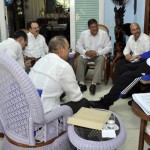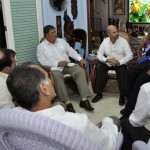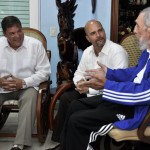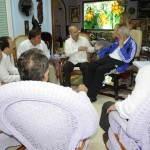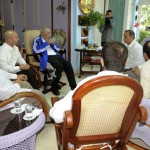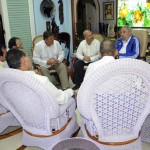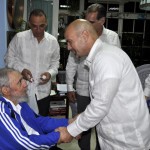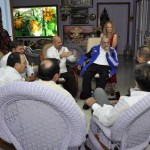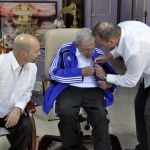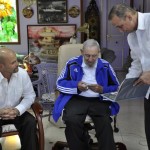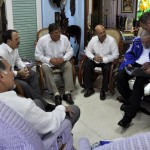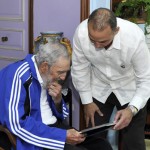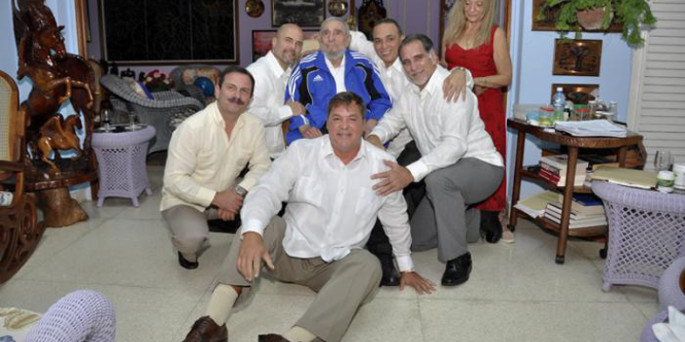
Five hours and 73 days later
MIAMI — Fidel writes in first person singular, with an ability to slip into the future with hints, rather than assertions. His latest article conceals, in the style of a chronicle, a plan for the future and a logical narrative consistent with processes in which he has had no leading role.
Much has been speculated about his delay in meeting with the five Cuban agents who were recently released. He was killed, he was pronounced terminal, he was said to be in a vegetative state. Once more, the Miami media and its paid acolytes had to live with the bitter taste of an unfulfilled wish.
At the same time, there were journalists, Cuban journalists, who said that when Maradona was in Havana last January he was welcomed by the Comandante, together with The Five. I know of newsrooms that waited for a photograph until the presses were ready to roll.
Both the meeting and the article that describes it are part of a strategy of public positioning by The Five for “future tasks.”
Not by chance, the gathering was joined by Alejandro Castro Espín, who, in recent appearances, has become a spokesman for the processes of transition coursing through the island, in a commitment with the continuity of the social project begun in 1959.
Nor is it by chance that Fidel wrote “None of the Five Heroes carried out his tasks in search of applause, reward or glory. They received their honorable titles because they didn’t seek them,” a sentence that reminds us, in its antithesis, of “The honey of power, for which they made no sacrifice, awoke in them ambitions that led them to an ignominious role. They fed the illusions of the external enemy.” That was his reference to the dismissal of Carlos Lage and Felipe Pérez Roque in 2009.
The two sentences, in their difference, speak of merit and loyalty. While to Lage and Pérez Roque “power” came without any sacrifice, The Five don’t need to demonstrate their commitment to the socialist project. Their rise to office would brook no challenge, the value of their loyalty precedes them. Thus, what Fidel does when he says that they sought no “applause, reward or glory” is to indicate that the space they occupy in the future will be theirs by their own merit.
What Fidel’s article is all about is about political capital. It is undeniable that The Five have an indisputable background of prestige and loyalty. Fernando González and Gerardo Hernández are graduates from the Higher Institute of International Relations; Ramón is an economist and Antonio an engineer. René is a flight instructor. They have training and knowledge, a second language — English — and international visibility.
This is important for Cuba. Other than Fidel and Raúl, the government’s apparatus has no faces with sufficient visibility. The Five combine the symbolism of the Cuban process and their fidelity to the social model with sufficient international recognition. In addition, they belong to a generation that was born with the Revolution.
The trial to which they were put, unjust and rigged, was known worldwide, and their release was a “trending topic.” The romantic image of bearded men symbolizing rebellion can continue in the affable faces of these fighters, whose personalities reflect the spirit of conciliation and resistance personified by Nelson Mandela. That symbolism has not faded at this time in Cuba’s history.
Another factor to bear in mind is that, on Feb. 24, the medal of Hero of the Republic of Cuba was pinned on them by President Raúl Castro. Four days later, they met officially with Fidel, as part of a well-conceived strategy of symbolic projection of their figures.
We shouldn’t forget, either, that the Tenth Plenum of the Central Committee of the Communist Party had announced a new Electoral Law the previous day.
The most cryptic sentence in Fidel’s text is the most revealing: “As early as yesterday, I wanted to meet with the Five Heroes. For five yours, that was the topic. Fortunately, I’ve had enough time since yesterday to ask them to invest part of their immense prestige into something that will be extremely useful for our people.”
“Something extremely useful” is a way to suggest The Five’s public projection toward posts of responsibility in Cuba’s government apparatus.
The future changes announced in the Electoral Law (term limits is the only sure change so far) constitute an appropriate framework for the released agents to occupy posts in the National Assembly and in institutions of international representation.
In fact, Fernando is already the vice president of the Cuban Institute of Friendship with the Peoples, an anteroom to possible diplomatic responsibilities in the future.
Facing the process of conciliation that the island will live in the next several years and the dizzying changes that approach, The Five could become an element of nationalist cohesion. Free of restrictive schemes, by rising to public office, they would enjoy international respect and the sympathy of the huge majority of the Cuban people.
Five hours and 73 days later, The Five and Fidel talk in future tense.
Progreso Semanal/ Weekly authorizes the total or partial reproduction of the articles by our journalists, so long as source and author are identified.


